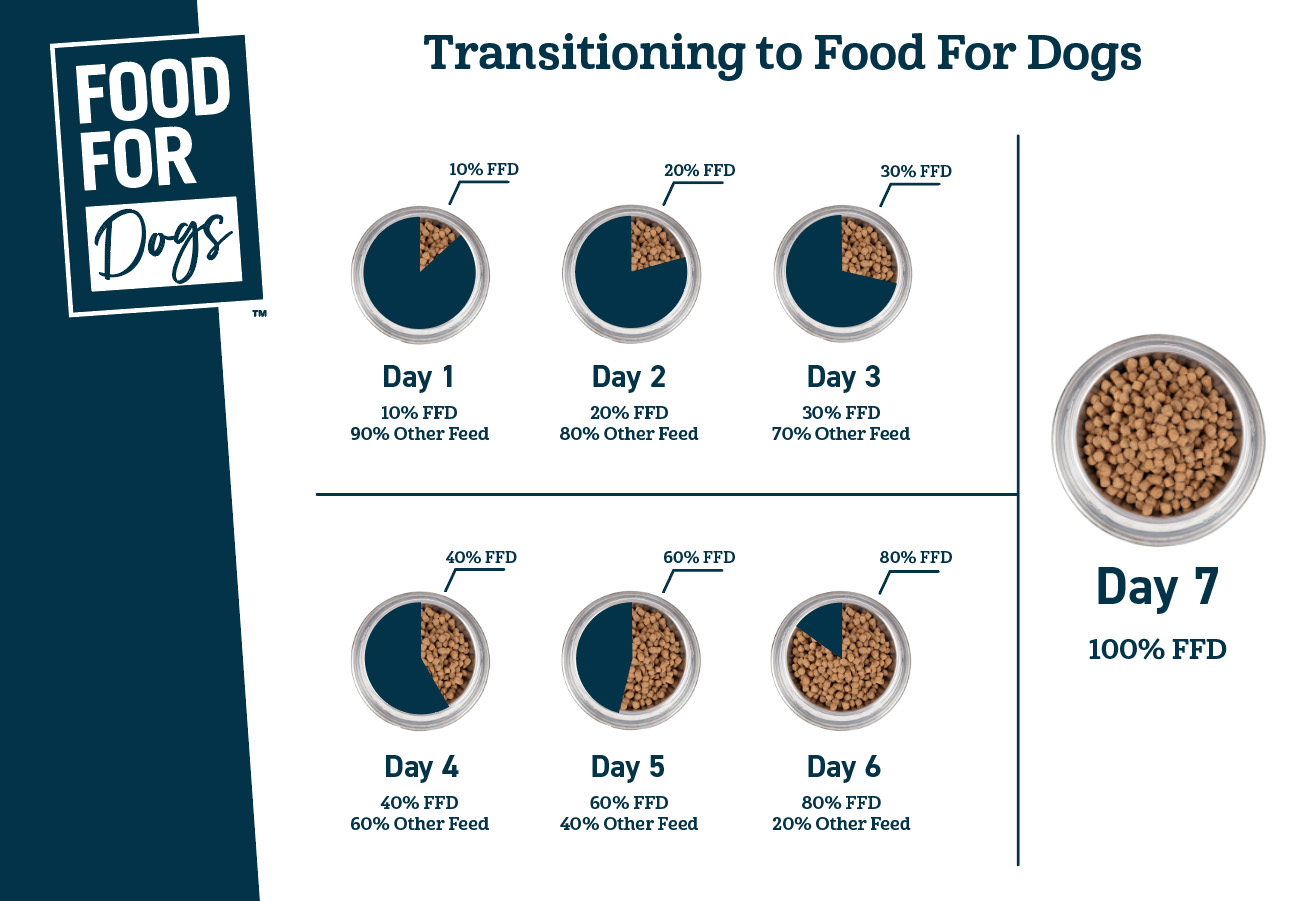
What makes Food for Dogs different to other brands of dog food?
While our dogs are members of our families, they have different nutritional requirements to ourselves and need to be fed as dogs and not as humans.
Food for Dogs is exactly what the name says – food for your dog.
We put dogs at the centre of our diets which are built to ensure our four legged friends lead healthy, happy, long lives. All of our recipes are built using the fewest number of quality ingredients possible, ensuring that all of these have a proven role in dog nutrition and used at levels where they will be effective. These are then turned into a tasty kibble using a 6-step process which locks in the nutritional goodness of the ingredients.
Does Food for Dogs contain cereal grains?
Food for Dogs contains a single cereal grain, barley, as a source of carbohydrates, which provide energy to your dog.
We use barley over other cereals and grains as the starch in it is digested more slowly providing your dog with a measured release of energy rather than a spike of energy.
Why does Food for Dogs include TruMune™?
TruMune™ is one of the few pet specific health products available that has been scientifically proven to enhance digestion, support immune function and reduce oxidative stress in domestic dogs. It therefore ticks our requirements that the ingredients used in the Food for Dogs recipes must have a proven role in supporting dogs to have healthy, happy and long lives.
Trumume™ has been developed by Diamond V one of the world leaders in developing animal health products and has been made available to Food for Dogs for exclusive use in its recipes.
For more information on Diamond V and TruMune™ please click here.
Which Vitamin and Minerals does Food For Dogs contain?
Food For Dogs contains:
- Vitamin A
- Vitamin D
- Vitamin E
- Vitamin K
- B Group Vitamins (B1 ,B2, B6, B12, B3, B5, B9)
- Vitamin H (aka Biotin)
- Iron
- Zinc
- Manganese
- Copper
- Selenium
- Iodine
- Choline
- Potassium
Why is the quality of a dog food important?
Quality encompasses a number of different aspects of a dog food including its:
- Nutritional quality. This is a measure of how closely a food matches the dog’s nutritional requirements. Food for Dog’s recipes are designed by our qualified dog nutritionist to be complete and balanced foods meaning that a dog could thrive off just eating them alone. They also meet the AAFCO nutritional guidelines which are one of the world’s leading authorities on pet food regulations.
- Digestibility. This is a measure of how easily a dog can digest a food and extract the nutritional value in it. Lower quality dog foods are poorly digested and absorbed which means that more of the food ends up in a dog’s poop. Food for Dogs recipes only use ingredients which we know dogs can digest and absorb easily and efficiently.
- Consistency. This is a measure of how consistent a dog food is from one bag to another. Higher quality dog foods, such as Food for Dogs, put an emphasis on making sure that their diets remain consistent across time, which not only ensures that a dog is getting every thing it needs in every mouthful, but also reduces the risk of a dog going off its food.
- Safety. This is measure of the risk that there is something potential harmful in the food, whether than be in the ingredients used, the presence of harmful bacteria or foreign matter. Food for Dogs is manufactured in an accredited facility and has stringent processes and procedures in place to ensure that the risk of anything going wrong is as low as it can be.
Is Food for Dogs suitable for all breeds of dogs?
Food for Dogs is suitable for all breeds of dogs with the exception of very small or very large breeds of dog which often have their own specific nutritional requirements and need a diet specifically formulated to meet these requirements.
Can I mix Food for Dogs with fresh meat or wet dog food?
Food for Dogs can be mixed with either fresh meat or wet dog food if this is what you dog prefers . Because Food for Dogs is a complete balanced and nutritional dense food in itself, you will need to reduce the amount of dry food being fed so as to not go over your dog’s energy intake requirements.
Always use your dog’s overall health and body condition as an indicator of if they are being fed enough with you are supplementing their diets
How do I transition my dog onto Food for Dogs?
It is important when introducing your dog to a new food that you transition from its old food to the new food gradually over a period of 7 to 10 days, even up to 14 days for dogs with sensitive stomachs. When transitioning your dog from one food to another make sure that you closely monitor their overall health and well-being and in the unlikely event you notice issues consult your veterinarian.

Where is Food for Dogs made?
Food for Dogs is made here in Australia in a plant located just outside Brisbane that is certified to meet the standards of Feedsafe and Pet Food Industry Association of Australia.
Can human food be used to treat my dog?
Human food should never be given to dogs on a regular basis. Not only is it not good for them nutritionally but it will also encourage begging behaviour every time you go to eat something.
From time to time, treating them with food that you enjoy is okay. – After all, sharing is one of the things we enjoy doing with our dogs. But there are some human foods you should never give your dog, others only on special occasions and some that you can do so guilt free.
| Never | Avocado, cherries, chocolate, coffee, raisins, grapes, onions, garlic, chives, xylitol, mushrooms. |
| Special occasions | Peanut butter (no added sugar, no artificial sugar), Yoghurt (as long as there isn’t any added sugar or artificial sugar), Cucumbers, Eggs, cooked Sweet Potato, Pumpkin, Rice (especially good when your dog has an upset stomach), Bananas, Cheese and Cottage cheese. |
| Guilt free | Carrots, Apple (seed and core removed), Broccoli, Green beans, Meat – Chicken, fish, Spinach Watermelon (seeds removed). |
This list is not exhaustive and intended as a guideline only. If you are not sure whether a treat is right for your pet or not, please consult your veterinarian.


